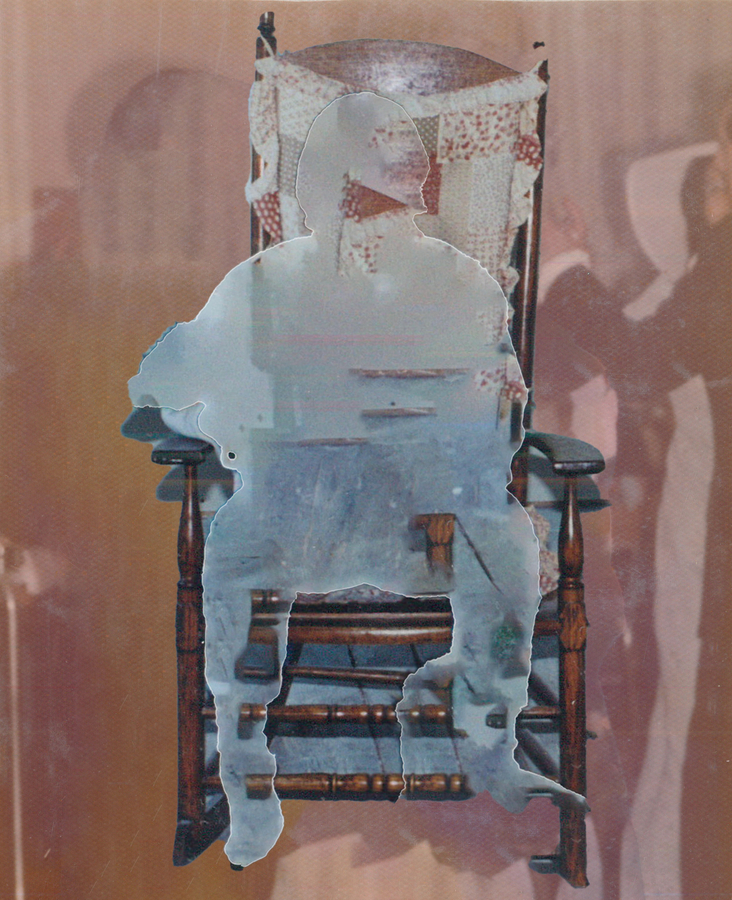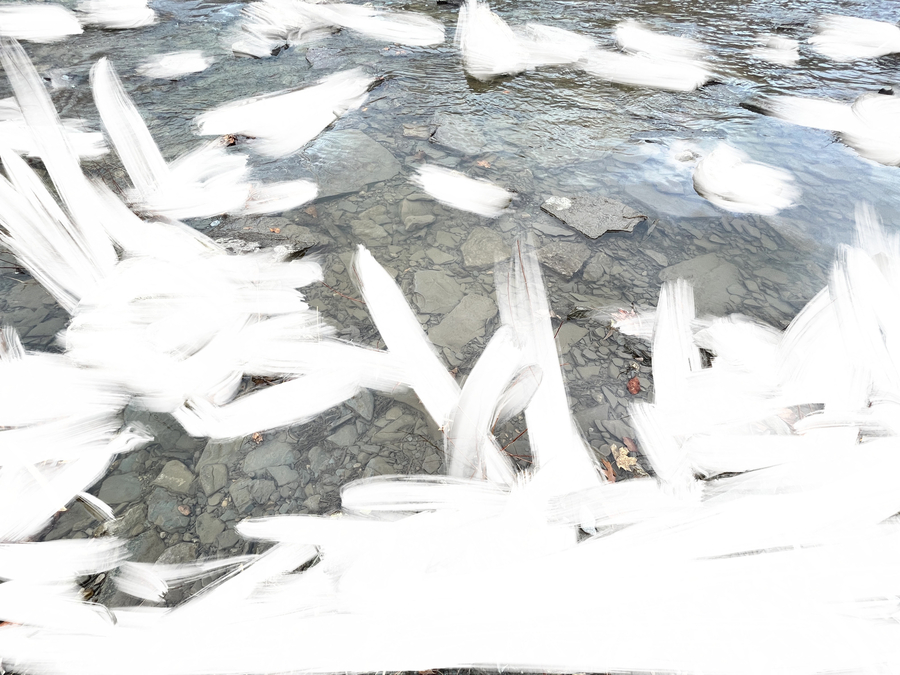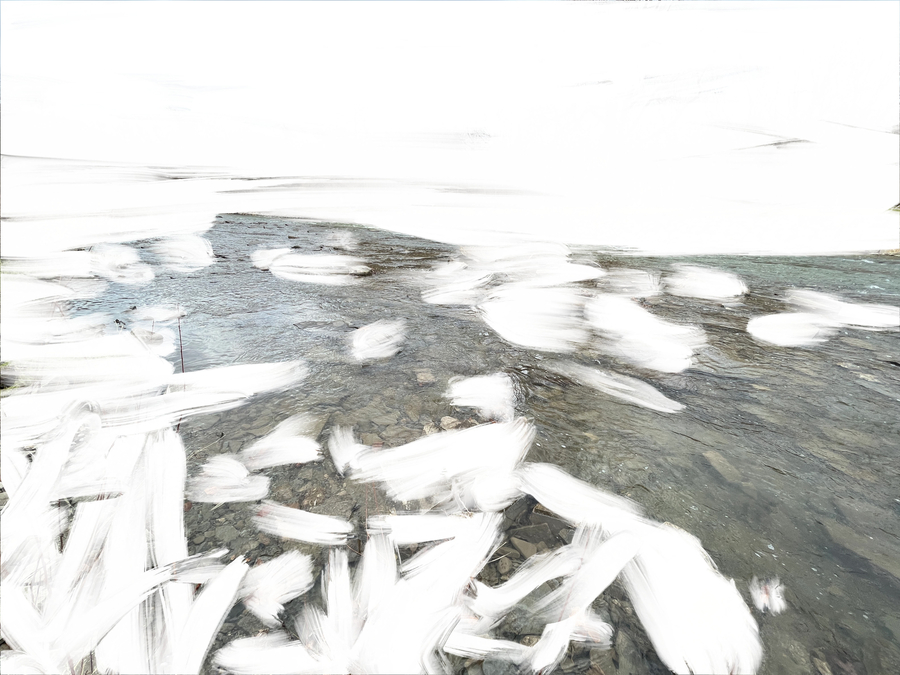Suzanne Morrissette with Clayton Morrissette What does good work look like?

In this exhibition, Toronto-based, Métis artist Suzanne Morrissette works with her brother Clayton to consider how exchanges between artists and their family members produce knowledge about history. Morrissette’s series of evocative photographs and videos reflect upon the act of imagining possible futures from within the context of climate catastrophe, ongoing colonial violence, and inequities and familial tensions exacerbated by the global pandemic.

“What does good work look like? This is a question I am asking about how we evaluate what has been learned and whether what has been learned and then been determined to be right has also been heeded. But what are the rubrics of this evaluation? As an artist I am thinking about this question from the perspective of my family and our home, and our pasts and futures as people who come from Indigenous and settler histories. How can I contribute in a good way to future-thinking that foregrounds the brilliance of Indigenous people while simultaneously tending to the ongoing impacts of profound injustice. The question asked by this exhibition aims to develop tools for evaluating the successes of endeavours towards good work from within values rooted in a sense of futurity that is sometimes personal, sometimes shared, and always dynamic.”
— Suzanne Morrissette
In the following essay, Winnipeg-based researcher Taylor Wilson expands upon the ideas raised in What does good work look like? through a personal narrative that explores her journey through academia and the process of reconnecting with her ancestry, history, and traditional knowledge. Wilson is an Ojibwe, Cree, and Filipina woman from Fisher River Cree Nation and has connections to Fairford, Peguis, and the Ilocano region of the Philippines.

Future Thinker
I’ve always been a future thinker—thinking about my next step, how to reach the next goal I’ve set for myself. What do I need to do today so that I have a good tomorrow? This habit comes out of a passion for breaking the cycles that I used to blame my family for perpetuating.
For a long time I used my Western education to escape. I thought that by disenfranchising myself, giving into the colonialism that sought for generations to pull me away from my past, I could get to my future. As I engaged in high school, then university, I drifted away from my family. I viewed them as anchors tied around my waist, dragging me into the Red River. I figured if I swam as hard as I could away from them I would eventually get to my destination. The thing was, I didn’t know where I was swimming.
I remember an argument with my mother. She was upset that I no longer visited home, that I went vegan and no longer ate the moose-meat stew she would make, that I would choose my friends over going medicine picking with her, that I had let my connection to my culture fall to the wayside. She cried when I told her I didn’t need my culture to have a good future. My education and training was all I needed to have a good life. She told me that my spirit would be lost if I didn’t take my culture, my identity, my history with me as I travelled through life. I shrugged it off.
It wasn’t until years later, as I sat in one of the classes for my master’s degree that I realized how I had been going about things all wrong. The class was taught by Elder Dan Thomas, who happened to be a friend of my parents. The class was supposed to be about Indigenous thoughts and worldviews, and it was meant to give us an idea of how all things were connected. Elder Dan would enter the classroom every day and ask us how we were doing—a question no other professor had cared to ask us. He would share stories that reminded me of the ones my mom told me growing up or give us teachings that connected to what we were learning in our other classes. One day when he asked us how we were doing, we went around the class sharing our feelings and when it got to me, I fell apart. I admitted that I felt a little lost in my path. Despite all my knowledge seeking, nothing seemed to click. While I had good grades, I still struggled to connect myself and my knowledge to my work.

I work with Indigenous peoples, and for years I had worked in Indigenous organizations that sought to keep families together, writing research papers and evaluating programs aimed at breaking ongoing cycles of intergenerational trauma and colonialism. Elder Dan’s response to my sadness was that I should pray for an answer to my grief and ask for guidance during our upcoming sweat.
It had been nearly five years since I had been in a sweat lodge, and part of me was excited. I got dressed in my ribbon skirt, helped haul wood, and sat in front of the fire and watched as small sparks jumped toward me, hoping to catch my shoes. I sat in the darkness, listening to Elder Dan as he sang. Eventually it got too hot for me and I put my face to the ground, feeling for the dirt beneath the false grass we sat on. When I finally found the cold ground with my fingers I began to cry. I immediately felt a yearning for my family as I listened to the sound of the drum, and smelled the cedar that he would toss onto the fire between songs. When I exited the sweat lodge it felt different than others, as though I had been cleansed. But there was still work to do.
I called my mother soon after, and we talked for hours. I realized that day that what my mom had said to me all those years earlier was true, that my spirit was lost and in need of connection—in typical “realizing your parents were right” fashion. It was suddenly clear that in order to find a good future, to be successful in my work, to break down intergenerational trauma and colonialism, and to build the family that I craved so badly growing up, that I needed to put that work into myself. I needed to reconnect to my identity and understand why for so many years I had been running from my family, from who I was. I have since realized that I felt lost because I couldn’t situate myself in this world. I had separated myself from the relationships I so badly needed. I had viewed my Western education as the be-all and end-all of knowledge and future building and forgot to recognize my family knowledge, my roles and responsibilities to myself and others, and my position as an Indigenous person, an Indigenous woman.
I’ve always been a future thinker but what I also needed was to reflect on my past. Connecting to culture, identity, and family is important for future building. I need, we all need, to be rooted in our ancestry, our families, and our land—those fundamental ideologies that make us Indigenous peoples—in order to navigate this world and build a future in which my children can live.
Essay by Taylor Wilson
Curated by Lillian O'Brien Davis
Presented in partnership with Gallery 44
Suzanne Morrissette
Dr. Suzanne Morrissette is a Metis artist, curator, scholar, and educator from Winnipeg. In her role as Assistant Professor at OCAD University Morrissette teaches in Indigenous Visual Culture and Curatorial Studies at undergraduate and graduate levels. Last year, she organized the speaker series Expansive Approaches to Indigenous Art Histories, which was supported by the Faculty of Graduate Studies’ Indigenous Innovation Fund. She has taught with OCAD University in various roles since 2009 and has served on the Indigenous Educational Council (formerly the Aboriginal Education Council) since 2015.
Suzanne Morrissette (she/her) is an artist, curator, and scholar who is currently based out of Toronto. Her father’s parents were Michif- and Cree-speaking Metis with family histories tied to the Interlake and Red River regions and Scrip in the area now known as Manitoba. Her mother’s parents came from Canadian-born farming families descended from United Empire loyalists and Mennonites from Russia. Morrissette was born and raised in Winnipeg and is a citizen of the Manitoba Metis Federation. As an artistic researcher Suzanne’s interests include: family and community knowledge, methods of translation, the telling of in-between histories, and practices of making that support and sustain life. Her two recent solo exhibitions What does good work look like? and translations recently opened in Toronto (Gallery 44) and Montreal (daphne art centre), respectively. Her work has appeared in numerous group exhibitions such as Lii Zoot Tayr (Other Worlds), an exhibition of Metis artists working with concepts of the unknowable, and the group exhibition of audio-based work about waterways called FLOW with imagineNATIVE Film + Media Art Festival. Morrissette holds a PhD from York University in Social and Political Thought. She currently holds the position of Assistant Professor and Graduate Program Director for the Criticism and Curatorial Practices and Contemporary Art, Design, and New Media Histories Masters programs at OCAD University.